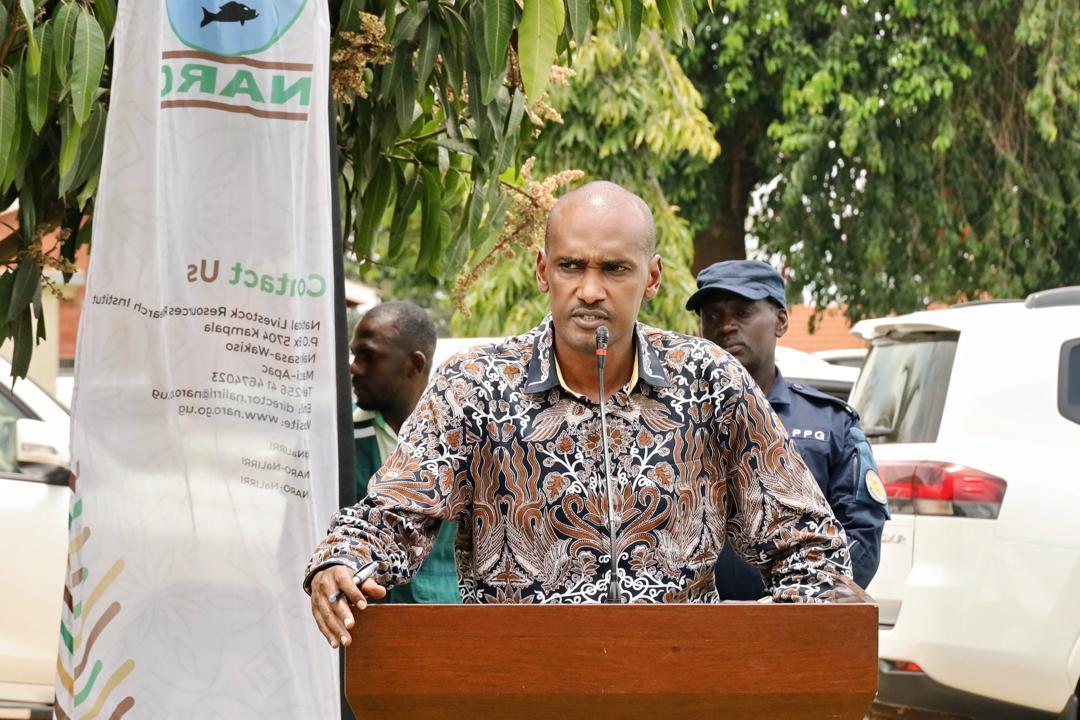Africa-Press – Uganda. The Minister for Agriculture Frank Tumwebaze has urged agricultural project teams to design initiatives that address entire value chains, cautioning against the dangers of fragmented approaches that ignore critical market linkages.
Speaking during a high-level World Bank mission at the National Livestock Resources Research Institute (NaLIRRI) in Nakyesasa, Wakiso District, Tumwebaze emphasized that siloed agricultural planning undermines long-term impact, citing Uganda’s vanilla sector as a case where production was promoted without adequate focus on market access.
“It’s dangerous to plan, say, for increased production alone without having a lens on markets,” the Minister said. “Agriculture can only be appropriately planned for with a focus on complete value chains.”
He noted that aligning projects with agricultural seasons is also crucial to avoid mismatches between supply and input delivery timelines.
Tumwebaze praised the National Agricultural Research Organisation (NARO) for its critical role in advancing Uganda’s research-led agricultural transformation and reiterated President Museveni’s commitment to strengthening agricultural innovation.
The visiting World Bank delegation, led by Qimiao Fan, Regional Director for Kenya, Rwanda, Somalia, and Uganda, and Francesca Ayo, Uganda Country Manager, toured NARO’s research facilities and praised the institution’s impact.
“During my last meeting with President Museveni, he asked me to visit NARO. I now realise it was because of the impressive work you are doing,” Fan said, noting NARO’s contributions to improving agricultural productivity and resilience.
He highlighted that Uganda’s maize yield of 2.3 metric tons per hectare is still far below the potential of 6 to 7 tons seen in other countries, suggesting significant room for growth in farmer incomes and sectoral competitiveness.
“If we reach that level, farmers will double or triple their incomes,” Fan said. “That’s why the World Bank continues to prioritize agriculture.”
Fan reaffirmed the Bank’s support for Uganda’s goal to grow its economy tenfold by 2040, in line with a national strategy focused on agro-industrialization, tourism, mineral development, and science and innovation. Uganda plans to expand its GDP from about shs190 trillion (USD 50 billion) to shs 1,900 trillion (USD 500 billion) within the next 15 years.
The World Bank team emphasized the importance of investing in climate-resilient agriculture, high-yielding seeds, irrigation systems, fertilizer access, and improvements in rural infrastructure such as roads and electrification to strengthen market connectivity across the country.
Fan also praised the zero-waste dairy production model at NaLIRRI as an example of how Uganda can build circular value chains that maximize product potential and reduce waste.
Dr. Yona Baguma, Director General of NARO, detailed the organization’s breakthroughs in developing high-yielding, drought- and disease-resistant crop varieties. These include coffee, maize, banana, rice, cassava, beans, groundnuts, sweet potato, millet, wheat, and others.
He explained that these innovations have helped improve food security, build resilience against climate change, supply raw materials for agro-processing, and strengthen national security.
Baguma acknowledged the World Bank’s longstanding support through projects such as the Agricultural Research and Training Project (ARTP I & II), Agricultural Technology and Agribusiness Advisory Services (ATAAS), and the Eastern Africa Agricultural Productivity Program (EAAPP).
These initiatives have enabled the rehabilitation of research institutions, the training of scientists to postgraduate levels, the upgrading of laboratories and equipment, and the establishment of regional centers of excellence for cassava, dairy, rice, and wheat.
Over the past 33 years, NARO has benefited significantly from the World Bank’s support, leading to the development of 294 crop varieties and the establishment of a Cassava Centre of Excellence.
Baguma stressed the need to further align research outputs with market needs, build stronger partnerships with the private sector, and scale up adoption of technologies that improve productivity and competitiveness.
He called for continued collaboration with the World Bank to support innovations that generate jobs, increase exports, build resilience, and elevate Uganda’s position as a continental leader in agro-industrial transformation.
As Uganda accelerates efforts to become a regional agro-industrial powerhouse, both government leaders and development partners are calling for a more integrated, market-driven approach to agriculture.
“This is about more than production. It’s about creating complete, profitable, and sustainable agricultural systems that change lives,”Minister Tumwebaze said.
For More News And Analysis About Uganda Follow Africa-Press






